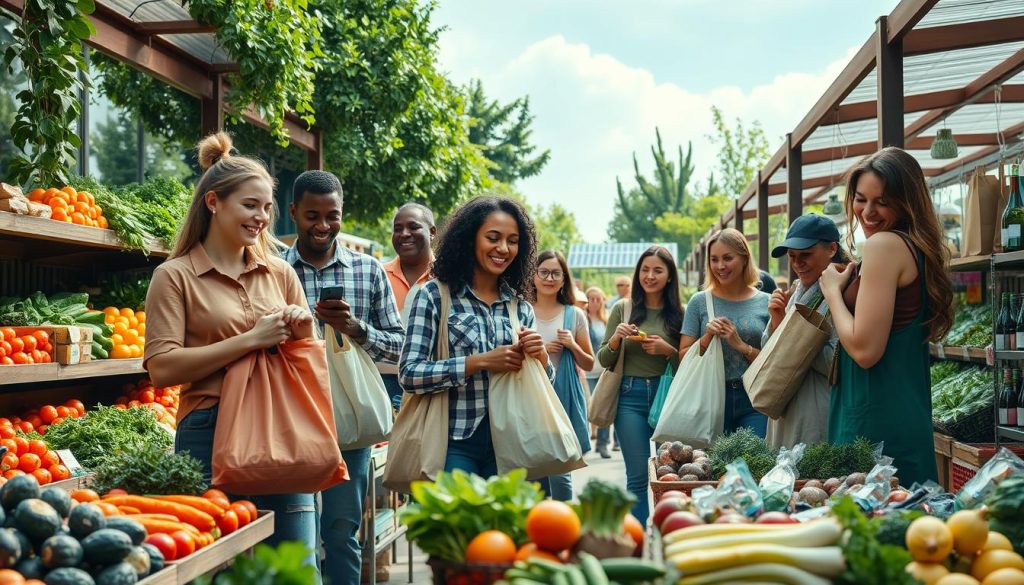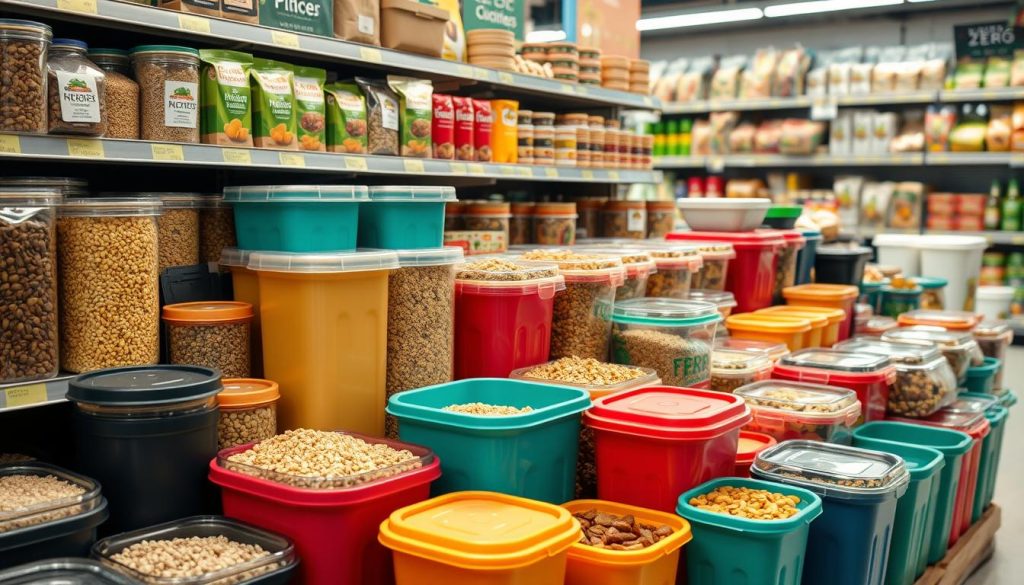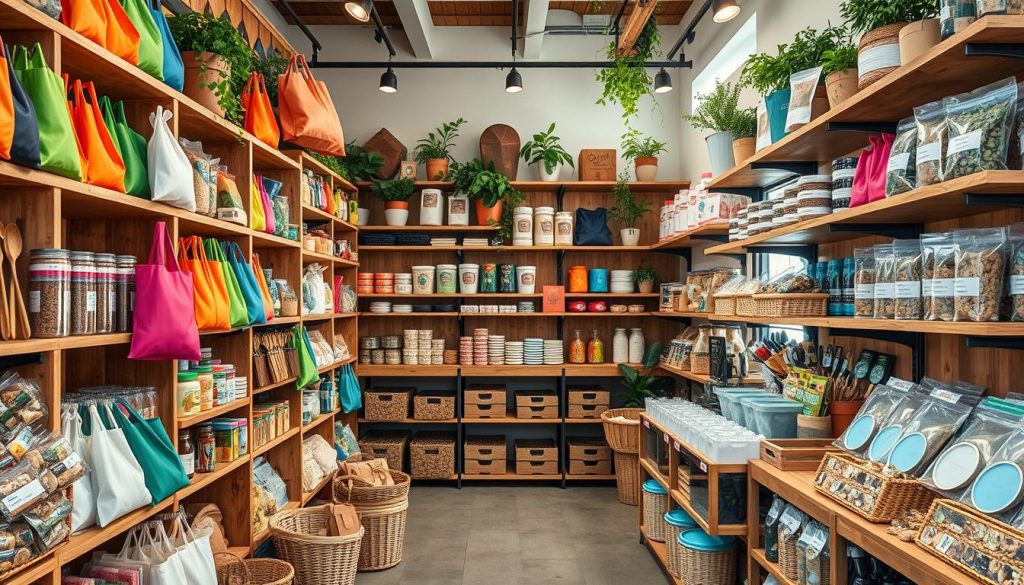I’ve always wanted to help our planet. Zero waste shopping changed everything for me. It made my daily life and shopping better.
Sustainable shopping is key, not just a trend. Zero waste shopping has taught me to live greener. Small changes in shopping can make a big difference for our planet.
Let’s explore zero waste shopping together. We’ll find ways to live more sustainably. Join me on this journey to a greener future!
Understanding the Zero Waste Movement
I’m excited to share with you the inspiring world of zero waste living. This movement is growing as more people choose a low-waste lifestyle. It’s all about reducing trash and protecting our planet.
The zero waste philosophy makes us think differently about what we buy. By using reusable items and buying in bulk, we can greatly reduce waste. This not only helps the environment but also saves us money over time.
Exploring this movement, I’ve learned that a low-waste lifestyle is about making small changes. It’s not about being perfect, but about making progress. Simple actions like using reusable bags and composting food scraps help a lot.
Zero waste living has shown me how our daily choices affect the planet. Being mindful of our purchases and waste helps create a sustainable future. It’s amazing to see how our actions can collectively protect our planet for the next generations.
Benefits of Sustainable Consumption

I’ve found that choosing sustainable products has many benefits. Green shopping helps our planet and improves our lives. Let’s look at how making eco-friendly choices can positively impact us.
Environmental Impact
Choosing sustainable products reduces my carbon footprint. I opt for items with little packaging to cut down on waste. This also supports conservation and protects nature.
Economic Advantages
Green shopping can save money over time. Buying durable items means I don’t need to replace them often. Plus, energy-efficient products lower my bills. Supporting local businesses also boosts my community’s economy.
Personal Health Benefits
Sustainable choices have made me healthier. I eat more organic, locally-sourced foods, which are better for me. Using natural cleaning products and biking keep me active and healthy.
| Aspect | Benefit | Impact |
|---|---|---|
| Environment | Reduced waste | Less pollution, conservation of resources |
| Economy | Long-term savings | Lower expenses, support for local businesses |
| Health | Improved well-being | Better nutrition, reduced exposure to toxins |
By choosing sustainable products, I’ve seen big changes. These choices inspire others to live healthier, more sustainable lives. Together, we can make a better future.
Essential Tools for Zero Waste Shopping
Having the right tools makes zero waste shopping easy. Let’s look at some must-haves for a sustainable lifestyle.
Reusable containers are key for zero waste shopping. I carry different containers for various needs:
- Glass jars for dry goods like nuts and grains
- Stainless steel containers for deli items
- Cloth bags for produce and bulk bin items
- Insulated containers for hot foods or liquids
Quality, durable reusable containers are worth the investment. They last longer and cut down on single-use plastics.
I always seek out plastic-free products. This includes bamboo toothbrushes, beeswax wraps, and stainless steel straws. These alternatives are better for the environment and often work better than plastic.
| Item | Plastic Alternative | Benefits |
|---|---|---|
| Water Bottle | Stainless Steel | Durable, keeps drinks cold/hot |
| Food Storage | Glass Containers | Microwave safe, doesn’t retain odors |
| Shopping Bags | Canvas Totes | Washable, sturdy, holds more weight |
With these essential tools, you’re ready for a zero waste shopping trip. Small changes can make a big difference for our planet.
Navigating Bulk Shopping: Tips and Tricks

Bulk shopping and package-free groceries are great for those who care about the planet. They help cut down on waste and can save you money. Here are some tips to help you shop in bulk like a pro.
Finding Bulk Stores Near You
Finding bulk stores near you is the first step. I use online directories and apps for zero-waste living to find stores. Many grocery stores have bulk sections now. Also, check out local farmers’ markets and co-ops for package-free items.
Preparing for Your Bulk Shopping Trip
Before you go, gather your reusable containers, bags, and jars. Make sure they’re clean and dry. Weigh them at home and label their tare weight. This makes checkout easier and ensures you pay the right price.
Weighing and Labeling Bulk Items
At the store, weigh your containers before filling them. Most bulk sections have scales and labels. Write down the item’s name or code and its weight. This helps cashiers calculate the price correctly.
By following these tips, bulk shopping becomes easy for me. It’s a fulfilling way to reduce waste and enjoy quality, package-free groceries.
Plastic-Free Products: What to Look For

I enjoy shopping at stores that sell eco-friendly products. There are so many plastic-free alternatives available today! When I’m looking for items without plastic, I look for a few important things.
First, I check the packaging. Many products come in glass, metal, or cardboard. These are better for recycling or composting. I also prefer items with little or no packaging.
Next, I think about how long the product lasts. Items that last longer are better for the planet. For instance, I choose stainless steel water bottles over disposable ones.
Here’s a quick list of plastic-free products I often buy:
- Bamboo toothbrushes
- Beeswax food wraps
- Reusable produce bags
- Stainless steel straws
- Solid shampoo and conditioner bars
When I shop, I always read labels carefully. Some products might seem plastic-free but actually have hidden plastic parts. By being careful, I can make choices that are truly good for the environment and reduce plastic waste.
Zero Waste Shopping: Making Eco-Friendly Choices
Zero waste shopping means making smart choices. When I’m at the store, I always think, “Do I really need this?” This helps me avoid buying things I don’t need and reduces packaging waste.
To make sustainable choices a regular part of my life, I follow these steps:
- Bring reusable bags for produce and groceries
- Choose products with minimal or recyclable packaging
- Buy in bulk to reduce overall packaging waste
- Look for items made from recycled materials
- Support local businesses that prioritize sustainability
Shopping at farmers’ markets has been a big help in my zero waste journey. I get fresh, local produce without any plastic packaging. It’s good for me and the planet.
For personal care items, I choose package-free options like shampoo bars and dental tablets. These choices cut down on plastic waste without sacrificing quality.
Zero waste shopping isn’t about being perfect. It’s about making better choices whenever you can. Every small step we take helps create a more sustainable future.
Embracing Reusable Containers: A Game-Changer
Reusable containers are essential for a low-waste lifestyle. They reduce single-use plastics and save money. Using them has greatly improved my daily life.
Types of Reusable Containers
There’s a wide range of reusable containers to choose from:
- Glass jars for dry goods and liquids
- Stainless steel containers for hot foods
- Silicone bags for snacks and sandwiches
- Cloth produce bags for fruits and veggies
Cleaning and Maintaining Your Containers
Keeping reusable containers clean is easy. I wash them with hot, soapy water after each use. For tough stains, I soak them in a baking soda and water mix. Drying them completely before storage prevents mold.
Creative Uses for Reusable Containers
Reusable containers aren’t just for food storage. I use them to organize small items in my home office and craft room. They’re also great for packing toiletries when traveling. Here’s a table of creative uses:
| Container Type | Creative Use |
|---|---|
| Mason Jars | Storing homemade beauty products |
| Cloth Bags | Gift wrapping |
| Stainless Steel Containers | Portable herb garden |
| Silicone Bags | Storing electronic cables |
By embracing reusable containers, I’ve made a big step towards a low-waste lifestyle. It’s a small change that makes a big impact on the environment and my daily habits.
Transitioning to a Low-Waste Lifestyle
Starting a low-waste lifestyle can seem tough at first. But, it’s all about beginning small and growing. By choosing to be a conscious consumer, we can greatly help our planet and ourselves.
Setting Realistic Goals
I began by setting goals I could reach. I replaced single-use items with reusable ones. This change cut down my waste a lot. Then, I aimed for bigger steps like buying in bulk and composting.
Overcoming Common Challenges
Finding eco-friendly products was a challenge for me. I found local bulk stores and farmers’ markets that fit my lifestyle. Online groups also helped with tips and encouragement when I needed it.
Celebrating Small Wins
It’s important to celebrate our progress. Every small win, like using a reusable water bottle or buying package-free food, counts. These victories make a big difference and give us a sense of pride.

